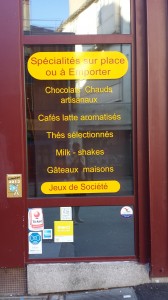As the semester draws to a close, I’ve been reflecting on how far I’ve come in language acquisition. While my classes are without a doubt helpful in acquiring new vocabulary, I’ve found that just living in France is indispensable when wanting to learn new words and phrases. Picking up vocabulary through context is far easier than memorizing a list from a book. Not only that, but sometimes not having a direct translation makes the words come easier.

One of the things I discovered upon arrival to France was that I didn’t know how carry a conversation. I knew mostly how to uphold my end, but when another person–my host mom, for example, was talking, I didn’t know how to indicate that yes, I was attentive and involved. When living in a homestay, it’s important to let the other party know you understand and you’re not just smiling and nodding. But saying, “Oui, oui” all the time gets boring and starts to sound like you don’t understand after all. So what do you do?
1. Recognize there’s a word you need that you can’t replace with other words.
There are a lot of ways to get around not knowing something. Every week or so, there always seems to be a word popping up often that nobody knows (a few weeks ago it was “sneeze”–éternuer). You can say “I did like this,” fake a sneeze, and continue on. You could say, “that thing like a cough, but not a cough,” and people would guess what you meant. However, doing this frequently usually brings you to the realization that this really is a word you ought to know. Why say five words when you could say one? And what happens when the word or phrase you need isn’t something you can look up in a dictionary, like “stuff to say to let someone know you’re listening?”
2. Ask, Look up, or Listen.
Asking is usually the best way to go if I want a quick answer. Looking it up is all right too, particularly if I’m alone, but asking means I’ll have a more tangible memory of my question. It helps to have a better context in which to remember the word. Describing it, acting it out, or pointing to it are all viable options. But what about words or phrases that aren’t so concrete? In that case, I usually listen. For this example, I started listening to things my host mom and professors said that I’d brushed over as “filler” before. Turns out I needed it! I started noticing that one of my professors said, “Ah ben, dis donc!” often, to let a student know she was listening to what they had to say–and that she agreed with them. I’m guessing an English translation might be, “Wow, yeah.”
3. Try it out
This is the hardest part for me. What if I’m wrong? Even after being here 4 months and making a mistake a minute, I still have a hard time going for something and knowing it might end in a correction. But it’s always worth it. Even if you’re wrong, you either get an explanation why, or an alternate thing to say–and context to remember it by! Sometimes, something wonderful happens and you don’t even realize you’re going for it. The other day, when my host mom was talking about something, my mouth opened and out came “Ah ben, dis donc!” Except it came out more like: “Ah, ben…dis…donc?” At first I was confident because after hearing the phrase so long, my subconcious knew what to say. But by the end, I was surprised to be saying it! I hadn’t planned it.
4. Repeat with confidence!
The best way to remember anything is to keep doing it. “Ah ben, dis donc” is probably going to become my “thing to say” for a couple weeks.
And that’s it! A quick little progression to show how I’ve learned some of my favorite day-to-day lingo. I hope there’s lots more to come during this last month!

